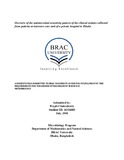Overview of the antimicrobial sensitivity pattern of the clinical isolates collected from patients at intensive care unit of a private hospital in Dhaka

View/
Date
2018-07Publisher
BRAC UniversityAuthor
Chakraborty, PraptiMetadata
Show full item recordAbstract
Antibiotic resistance is one of the significant threat to public health. Every time a person takes an antibiotic, sensitive bacteria gets killed, resistant ones survive and then multiply. This may happen even more if the antibiotic dosage is unregulated and unnecessary. The purpose of this study is to give a clear picture of the position of antibiotic resistance in Dhaka, using 40 clinical samples which were collected from a private hospital, located in Dhaka. A collection of 40 samples from the intensive care unit of Uttara Adhunik Medical College and Hospital was done. Twenty-three isolates of Pseudomonas spp., nine isolates of Klebsiellaspand eight isolates of E. coli sp were found. To have an idea about the identities of the organisms, the organisms were cultured in different suitable selective media. In addition to this, eight biochemical tests were done to confirm their identities. Next, by the Kirby-Bauer disk diffusion method, their antibiotic susceptibilities were tested, to observe how over the years the organisms‟ susceptibility pattern has changed. For the antibiogram test, the most common and reliable antibiotics such as amoxicillin, amoxyclav, aztreonam, imipenem, colistin, gentamycin, cefepime, sulfamethoazole, levofloxacin and a combination of third and fourth generation cephalosporins were selected. In total 11 different antibiotics were used for this study. All the antibiotics mentioned above were tested, considering the antibiotic susceptibility profile of each of the organisms‟ in the past. All the isolates of Pseudomonas sp were resistant to cefotazime, cefexime, amoxicillin, imipenem, cefatrizone, and levofloxacin. Furthermore, all the Pseudomonas sp. isolates were sensitive to aztreonam, gentamycin, colistin, amoxyclav, and cefepime. On the contrary, all the Klebsiella sp. isolates showed resistance to cefepime, aztreonam, amoxyclav, amoxicillin, levofloxacin, cefexime, cefotazime, ceftriazone, and imipenem. However, all of the Klebsiella sp. isolates showed sensitivity to gentamycin and colistin.
All the E. coli sp isolates showed sensitive results to gentamycin, cefepime, colistin, amoxyclav, aztreonam, sulfamethoazole, and cefexime. All the eight strains of E. coli sp. were resistant to amoxicillin, imipenem, cefotazime, and levofloxacin.
